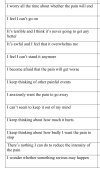Abstract
This study aims to evaluate the impact of pain catastrophizing (PC) on disease activity in patients with rheumatoid arthritis (RA) and to explore, in the same participants, if this association is related or not with anxiety and depression, which have been related to catastrophization in patients with chronic pain. A multi-center, observational study has been conducted on 158 RA patients from six Rheumatology Clinics. Participants were assessed using the Clinical Disease Activity Index (CDAI) and Simple Disease Activity Index (SDAI) and Disease Activity Score on 28 joints- C reactive protein (DAS28-CRP). Pain Catastrophizing, with its domains of Helplessness, Rumination and Magnification, was analyzed through Pain Catastrophizing Scale (PCS). Statistical analyses included univariable and multivariable regressions, to identify associations between disease activity and PC. Results revealed that higher PCS scores were significantly associated with increased CDAI, SDAI and DAS28-CRP values, indicating higher disease activity. Specifically, the domains of Rumination and Helplessness showed a strong correlation with disease activity, while Magnification did not. These associations persisted independently of anxiety and depression mood, as shown by multivariable regression analysis. Pain catastrophizing, particularly the domains of Rumination and Helplessness, significantly influences disease activity in RA patients, independent of mood disorders. These findings underscore the importance of addressing maladaptive cognitive perceptions of pain in the management of RA, to improve patient outcomes and facilitate disease remission.open access: https://www.nature.com/articles/s41598-025-21749-1.pdf

